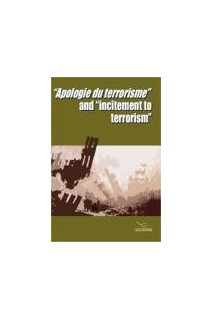



The fight against terrorism must never lead to a curtailing of the values and freedoms terrorists intend to destroy: the rule of law and freedom of thought and expression must never be sacrificed in this struggle. However, not everything can be justified in the name of such freedom. Contrary to politically- or ideologically-motivated statements, the approval of and incitement to behaviour criminalised by law are not necessarily protected by the freedom of expression.This report analyses the situation in member and observer States of the Council of Europe and their different legal approaches to the phenomenon of the public expression of praise, justification and other forms of support for terrorism and terrorists, referred to in this publication as "Apologie du terrorisme" and "incitement to terrorism".

The fight against terrorism must never lead to a curtailing of the values and freedoms terrorists intend to destroy: the rule of law and freedom of thought and expression must never be sacrificed in this struggle. However, not everything can be justified in the name of such freedom. Contrary to politically- or ideologically-motivated statements, the approval of and incitement to behaviour criminalised by law are not necessarily protected by the freedom of expression.This report analyses the situation in member and observer States of the Council of Europe and their different legal approaches to the phenomenon of the public expression of praise, justification and other forms of support for terrorism and terrorists, referred to in this publication as "Apologie du terrorisme" and "incitement to terrorism".
Attention, en vertu de nos conditions générales de vente, l'achat des PDF/epub est réservé aux particuliers.
